Legal Case Study: Doverwood Ltd. and International Trade Law
VerifiedAdded on 2020/04/21
|16
|3714
|111
Case Study
AI Summary
This case study analyzes the legal provisions governing the transportation of goods on international waters, focusing on a scenario involving Doverwood Limited, a furniture manufacturer exporting to Singapore and importing wood from Costa Rica. The analysis covers the Carriage of Goods by Sea...
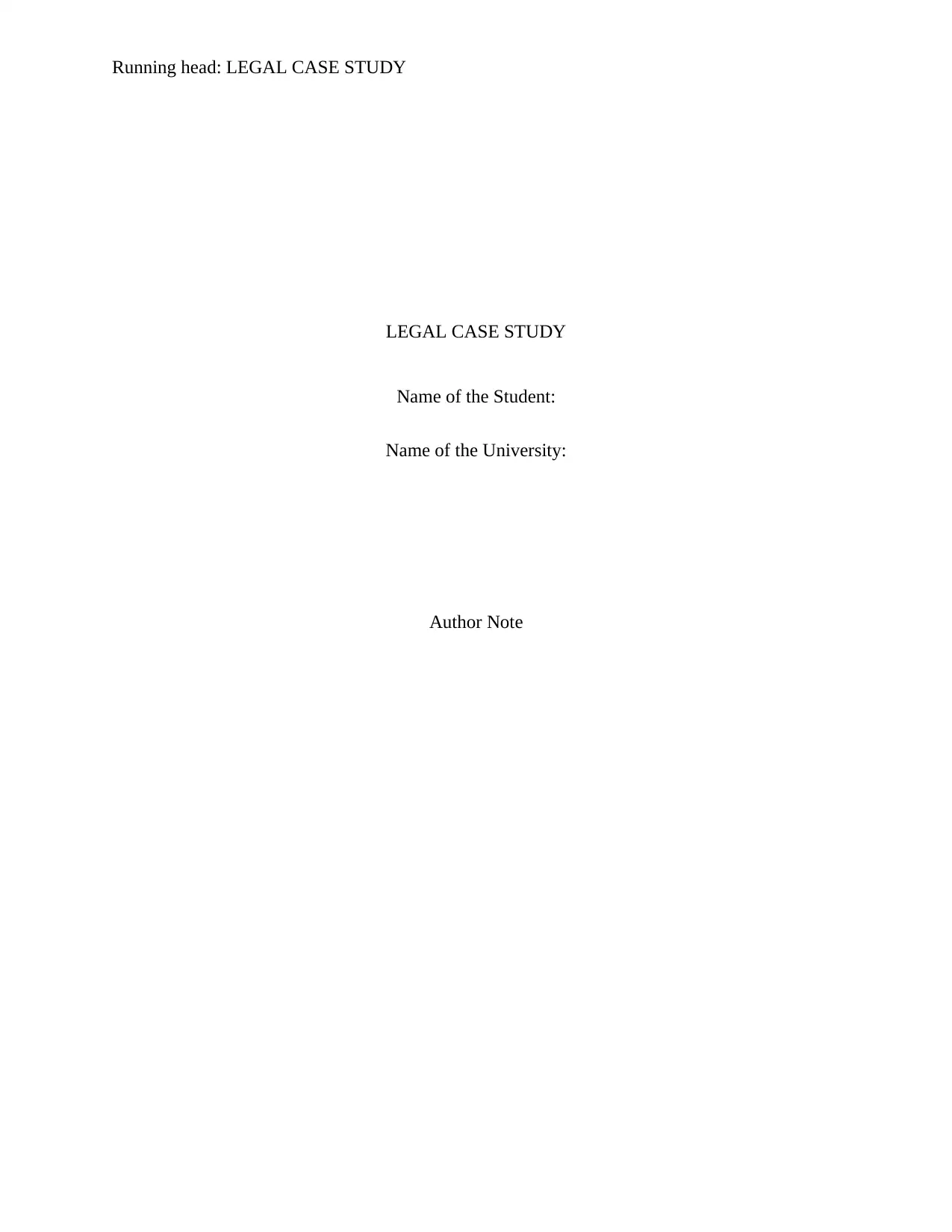
Running head: LEGAL CASE STUDY
LEGAL CASE STUDY
Name of the Student:
Name of the University:
Author Note
LEGAL CASE STUDY
Name of the Student:
Name of the University:
Author Note
Paraphrase This Document
Need a fresh take? Get an instant paraphrase of this document with our AI Paraphraser
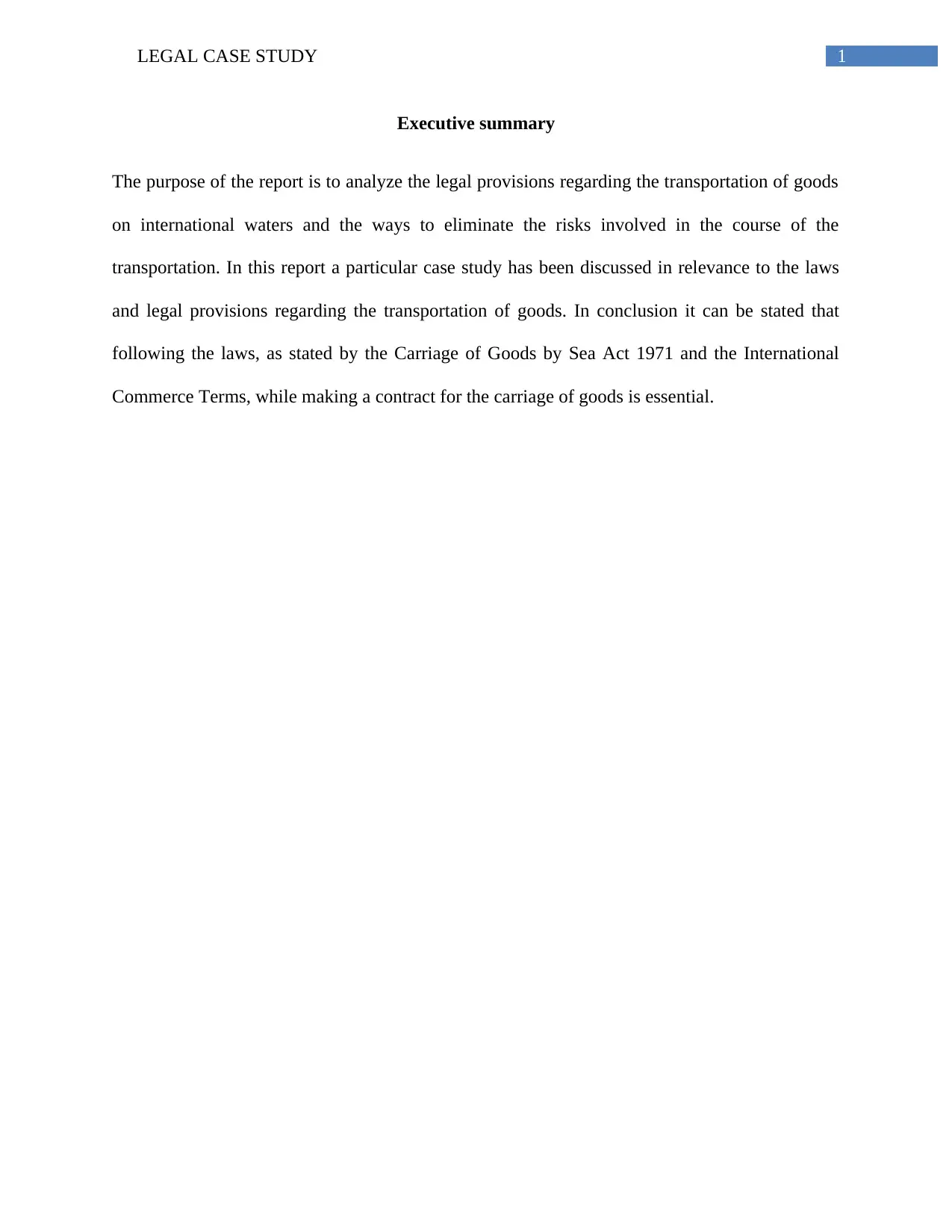
1LEGAL CASE STUDY
Executive summary
The purpose of the report is to analyze the legal provisions regarding the transportation of goods
on international waters and the ways to eliminate the risks involved in the course of the
transportation. In this report a particular case study has been discussed in relevance to the laws
and legal provisions regarding the transportation of goods. In conclusion it can be stated that
following the laws, as stated by the Carriage of Goods by Sea Act 1971 and the International
Commerce Terms, while making a contract for the carriage of goods is essential.
Executive summary
The purpose of the report is to analyze the legal provisions regarding the transportation of goods
on international waters and the ways to eliminate the risks involved in the course of the
transportation. In this report a particular case study has been discussed in relevance to the laws
and legal provisions regarding the transportation of goods. In conclusion it can be stated that
following the laws, as stated by the Carriage of Goods by Sea Act 1971 and the International
Commerce Terms, while making a contract for the carriage of goods is essential.
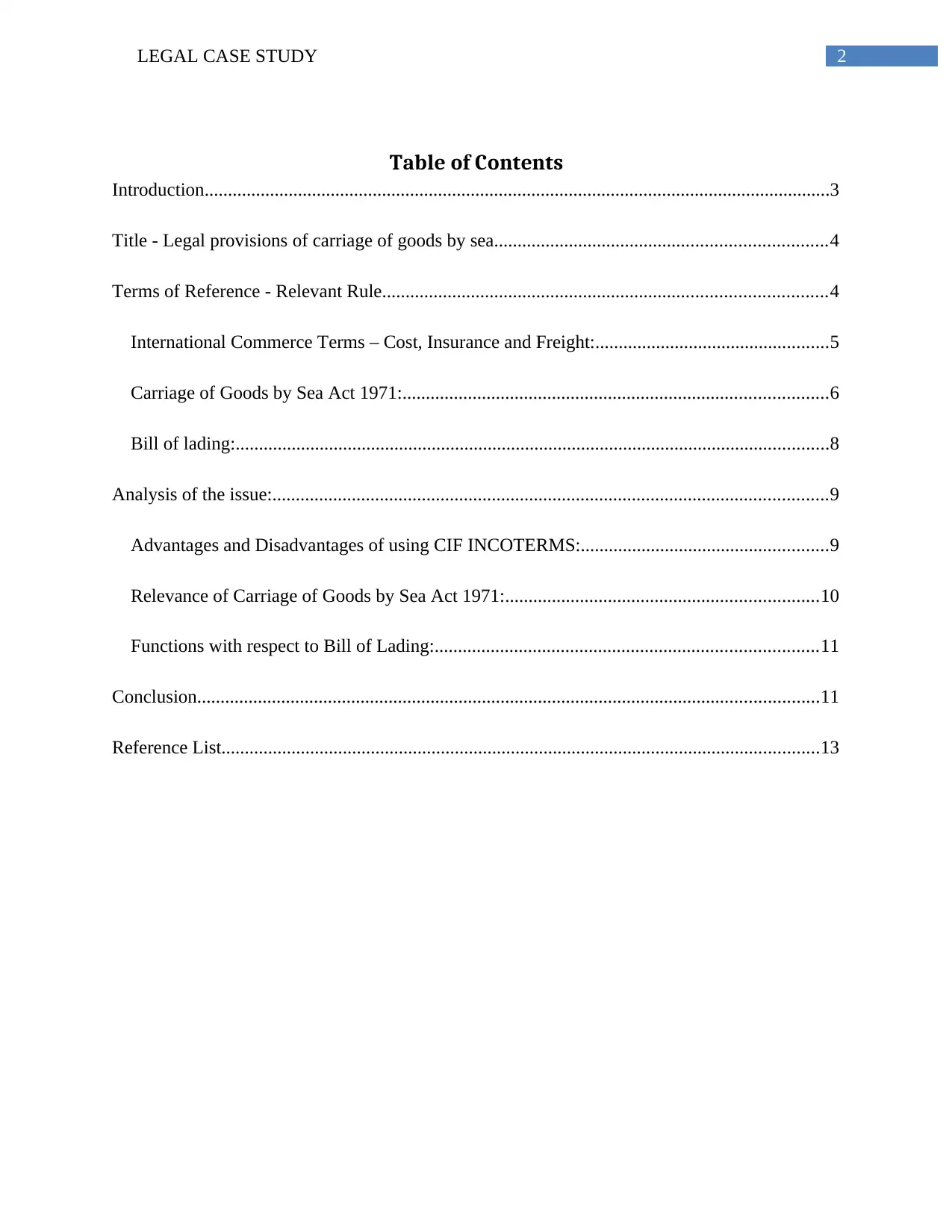
2LEGAL CASE STUDY
Table of Contents
Introduction......................................................................................................................................3
Title - Legal provisions of carriage of goods by sea.......................................................................4
Terms of Reference - Relevant Rule...............................................................................................4
International Commerce Terms – Cost, Insurance and Freight:..................................................5
Carriage of Goods by Sea Act 1971:...........................................................................................6
Bill of lading:...............................................................................................................................8
Analysis of the issue:.......................................................................................................................9
Advantages and Disadvantages of using CIF INCOTERMS:.....................................................9
Relevance of Carriage of Goods by Sea Act 1971:...................................................................10
Functions with respect to Bill of Lading:..................................................................................11
Conclusion.....................................................................................................................................11
Reference List................................................................................................................................13
Table of Contents
Introduction......................................................................................................................................3
Title - Legal provisions of carriage of goods by sea.......................................................................4
Terms of Reference - Relevant Rule...............................................................................................4
International Commerce Terms – Cost, Insurance and Freight:..................................................5
Carriage of Goods by Sea Act 1971:...........................................................................................6
Bill of lading:...............................................................................................................................8
Analysis of the issue:.......................................................................................................................9
Advantages and Disadvantages of using CIF INCOTERMS:.....................................................9
Relevance of Carriage of Goods by Sea Act 1971:...................................................................10
Functions with respect to Bill of Lading:..................................................................................11
Conclusion.....................................................................................................................................11
Reference List................................................................................................................................13
⊘ This is a preview!⊘
Do you want full access?
Subscribe today to unlock all pages.

Trusted by 1+ million students worldwide
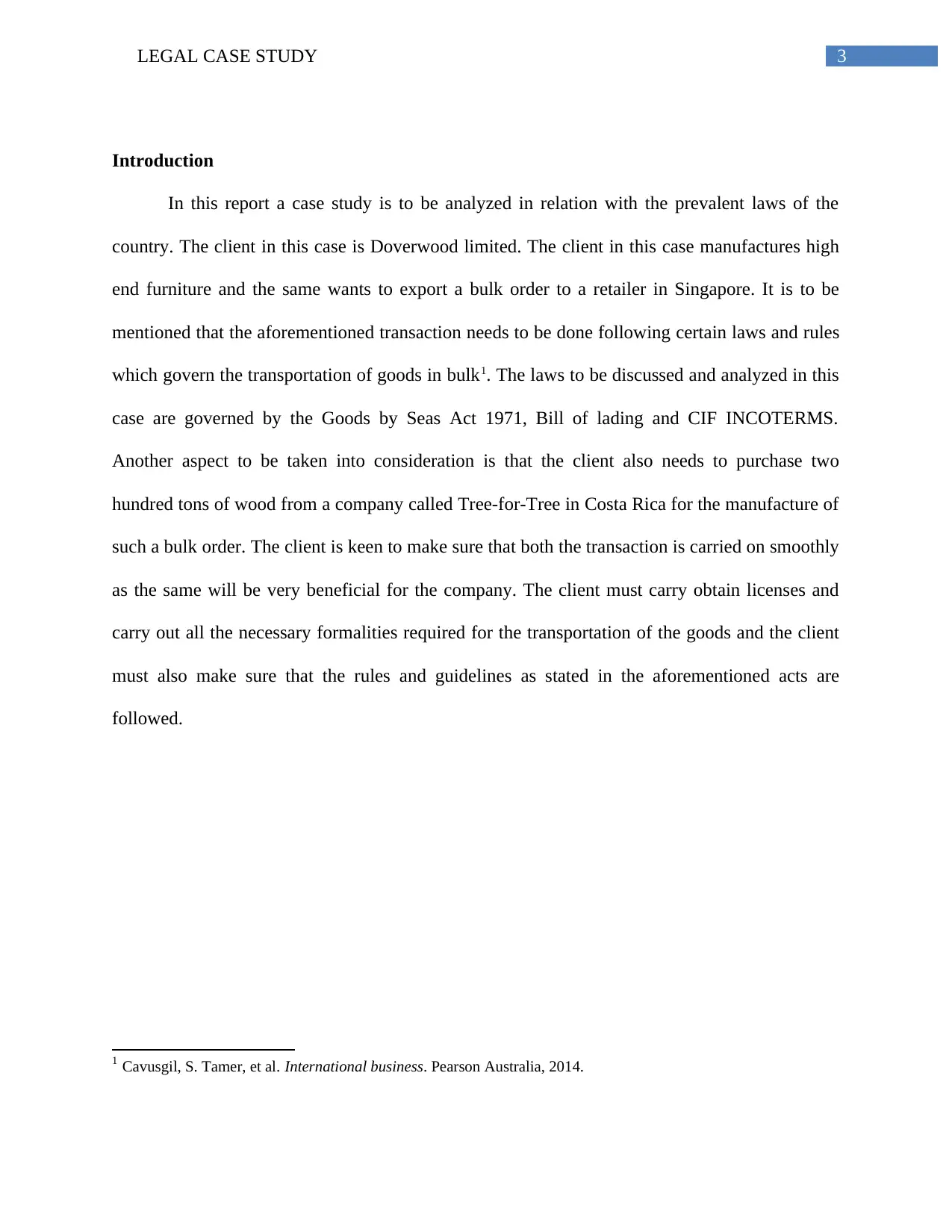
3LEGAL CASE STUDY
Introduction
In this report a case study is to be analyzed in relation with the prevalent laws of the
country. The client in this case is Doverwood limited. The client in this case manufactures high
end furniture and the same wants to export a bulk order to a retailer in Singapore. It is to be
mentioned that the aforementioned transaction needs to be done following certain laws and rules
which govern the transportation of goods in bulk1. The laws to be discussed and analyzed in this
case are governed by the Goods by Seas Act 1971, Bill of lading and CIF INCOTERMS.
Another aspect to be taken into consideration is that the client also needs to purchase two
hundred tons of wood from a company called Tree-for-Tree in Costa Rica for the manufacture of
such a bulk order. The client is keen to make sure that both the transaction is carried on smoothly
as the same will be very beneficial for the company. The client must carry obtain licenses and
carry out all the necessary formalities required for the transportation of the goods and the client
must also make sure that the rules and guidelines as stated in the aforementioned acts are
followed.
1 Cavusgil, S. Tamer, et al. International business. Pearson Australia, 2014.
Introduction
In this report a case study is to be analyzed in relation with the prevalent laws of the
country. The client in this case is Doverwood limited. The client in this case manufactures high
end furniture and the same wants to export a bulk order to a retailer in Singapore. It is to be
mentioned that the aforementioned transaction needs to be done following certain laws and rules
which govern the transportation of goods in bulk1. The laws to be discussed and analyzed in this
case are governed by the Goods by Seas Act 1971, Bill of lading and CIF INCOTERMS.
Another aspect to be taken into consideration is that the client also needs to purchase two
hundred tons of wood from a company called Tree-for-Tree in Costa Rica for the manufacture of
such a bulk order. The client is keen to make sure that both the transaction is carried on smoothly
as the same will be very beneficial for the company. The client must carry obtain licenses and
carry out all the necessary formalities required for the transportation of the goods and the client
must also make sure that the rules and guidelines as stated in the aforementioned acts are
followed.
1 Cavusgil, S. Tamer, et al. International business. Pearson Australia, 2014.
Paraphrase This Document
Need a fresh take? Get an instant paraphrase of this document with our AI Paraphraser
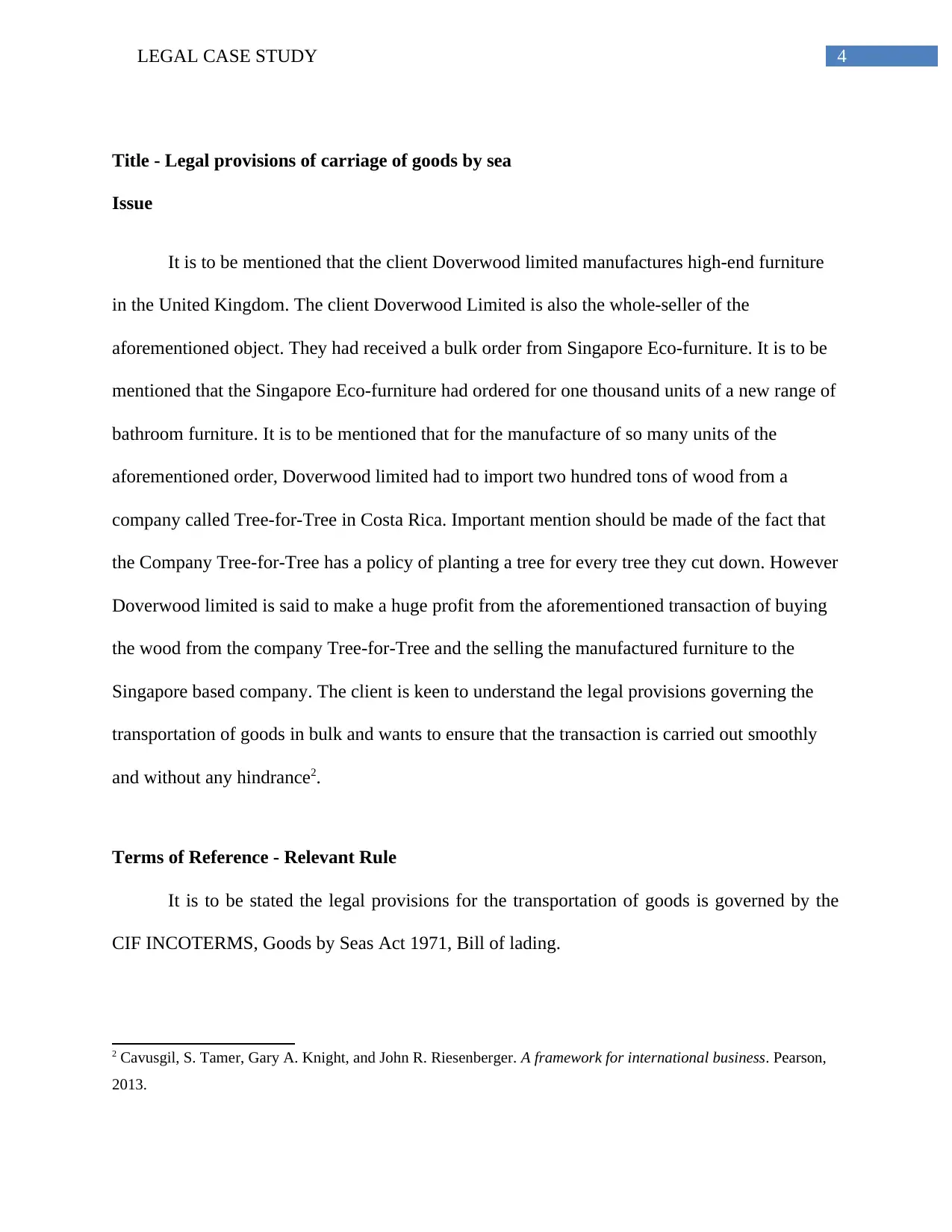
4LEGAL CASE STUDY
Title - Legal provisions of carriage of goods by sea
Issue
It is to be mentioned that the client Doverwood limited manufactures high-end furniture
in the United Kingdom. The client Doverwood Limited is also the whole-seller of the
aforementioned object. They had received a bulk order from Singapore Eco-furniture. It is to be
mentioned that the Singapore Eco-furniture had ordered for one thousand units of a new range of
bathroom furniture. It is to be mentioned that for the manufacture of so many units of the
aforementioned order, Doverwood limited had to import two hundred tons of wood from a
company called Tree-for-Tree in Costa Rica. Important mention should be made of the fact that
the Company Tree-for-Tree has a policy of planting a tree for every tree they cut down. However
Doverwood limited is said to make a huge profit from the aforementioned transaction of buying
the wood from the company Tree-for-Tree and the selling the manufactured furniture to the
Singapore based company. The client is keen to understand the legal provisions governing the
transportation of goods in bulk and wants to ensure that the transaction is carried out smoothly
and without any hindrance2.
Terms of Reference - Relevant Rule
It is to be stated the legal provisions for the transportation of goods is governed by the
CIF INCOTERMS, Goods by Seas Act 1971, Bill of lading.
2 Cavusgil, S. Tamer, Gary A. Knight, and John R. Riesenberger. A framework for international business. Pearson,
2013.
Title - Legal provisions of carriage of goods by sea
Issue
It is to be mentioned that the client Doverwood limited manufactures high-end furniture
in the United Kingdom. The client Doverwood Limited is also the whole-seller of the
aforementioned object. They had received a bulk order from Singapore Eco-furniture. It is to be
mentioned that the Singapore Eco-furniture had ordered for one thousand units of a new range of
bathroom furniture. It is to be mentioned that for the manufacture of so many units of the
aforementioned order, Doverwood limited had to import two hundred tons of wood from a
company called Tree-for-Tree in Costa Rica. Important mention should be made of the fact that
the Company Tree-for-Tree has a policy of planting a tree for every tree they cut down. However
Doverwood limited is said to make a huge profit from the aforementioned transaction of buying
the wood from the company Tree-for-Tree and the selling the manufactured furniture to the
Singapore based company. The client is keen to understand the legal provisions governing the
transportation of goods in bulk and wants to ensure that the transaction is carried out smoothly
and without any hindrance2.
Terms of Reference - Relevant Rule
It is to be stated the legal provisions for the transportation of goods is governed by the
CIF INCOTERMS, Goods by Seas Act 1971, Bill of lading.
2 Cavusgil, S. Tamer, Gary A. Knight, and John R. Riesenberger. A framework for international business. Pearson,
2013.
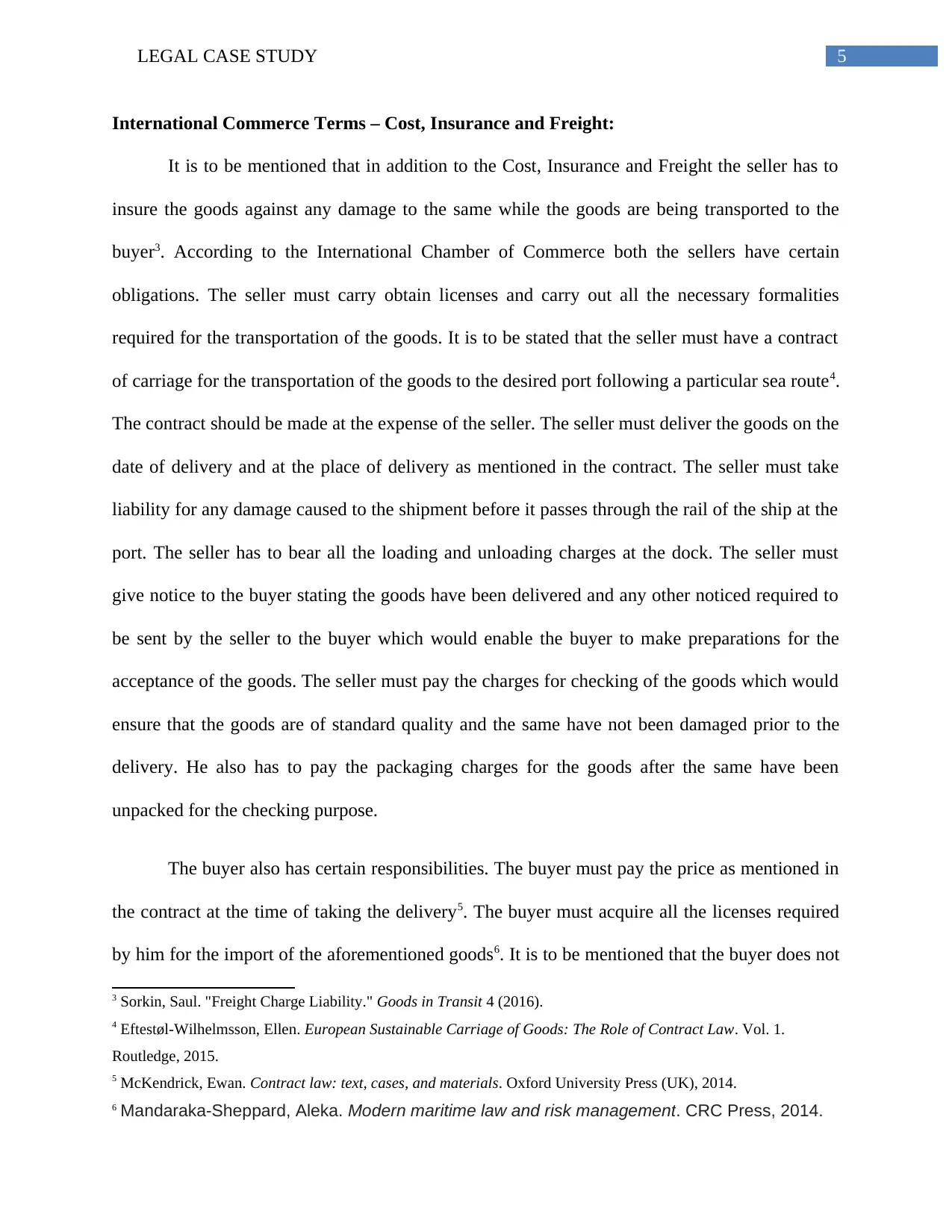
5LEGAL CASE STUDY
International Commerce Terms – Cost, Insurance and Freight:
It is to be mentioned that in addition to the Cost, Insurance and Freight the seller has to
insure the goods against any damage to the same while the goods are being transported to the
buyer3. According to the International Chamber of Commerce both the sellers have certain
obligations. The seller must carry obtain licenses and carry out all the necessary formalities
required for the transportation of the goods. It is to be stated that the seller must have a contract
of carriage for the transportation of the goods to the desired port following a particular sea route4.
The contract should be made at the expense of the seller. The seller must deliver the goods on the
date of delivery and at the place of delivery as mentioned in the contract. The seller must take
liability for any damage caused to the shipment before it passes through the rail of the ship at the
port. The seller has to bear all the loading and unloading charges at the dock. The seller must
give notice to the buyer stating the goods have been delivered and any other noticed required to
be sent by the seller to the buyer which would enable the buyer to make preparations for the
acceptance of the goods. The seller must pay the charges for checking of the goods which would
ensure that the goods are of standard quality and the same have not been damaged prior to the
delivery. He also has to pay the packaging charges for the goods after the same have been
unpacked for the checking purpose.
The buyer also has certain responsibilities. The buyer must pay the price as mentioned in
the contract at the time of taking the delivery5. The buyer must acquire all the licenses required
by him for the import of the aforementioned goods6. It is to be mentioned that the buyer does not
3 Sorkin, Saul. "Freight Charge Liability." Goods in Transit 4 (2016).
4 Eftestøl-Wilhelmsson, Ellen. European Sustainable Carriage of Goods: The Role of Contract Law. Vol. 1.
Routledge, 2015.
5 McKendrick, Ewan. Contract law: text, cases, and materials. Oxford University Press (UK), 2014.
6 Mandaraka-Sheppard, Aleka. Modern maritime law and risk management. CRC Press, 2014.
International Commerce Terms – Cost, Insurance and Freight:
It is to be mentioned that in addition to the Cost, Insurance and Freight the seller has to
insure the goods against any damage to the same while the goods are being transported to the
buyer3. According to the International Chamber of Commerce both the sellers have certain
obligations. The seller must carry obtain licenses and carry out all the necessary formalities
required for the transportation of the goods. It is to be stated that the seller must have a contract
of carriage for the transportation of the goods to the desired port following a particular sea route4.
The contract should be made at the expense of the seller. The seller must deliver the goods on the
date of delivery and at the place of delivery as mentioned in the contract. The seller must take
liability for any damage caused to the shipment before it passes through the rail of the ship at the
port. The seller has to bear all the loading and unloading charges at the dock. The seller must
give notice to the buyer stating the goods have been delivered and any other noticed required to
be sent by the seller to the buyer which would enable the buyer to make preparations for the
acceptance of the goods. The seller must pay the charges for checking of the goods which would
ensure that the goods are of standard quality and the same have not been damaged prior to the
delivery. He also has to pay the packaging charges for the goods after the same have been
unpacked for the checking purpose.
The buyer also has certain responsibilities. The buyer must pay the price as mentioned in
the contract at the time of taking the delivery5. The buyer must acquire all the licenses required
by him for the import of the aforementioned goods6. It is to be mentioned that the buyer does not
3 Sorkin, Saul. "Freight Charge Liability." Goods in Transit 4 (2016).
4 Eftestøl-Wilhelmsson, Ellen. European Sustainable Carriage of Goods: The Role of Contract Law. Vol. 1.
Routledge, 2015.
5 McKendrick, Ewan. Contract law: text, cases, and materials. Oxford University Press (UK), 2014.
6 Mandaraka-Sheppard, Aleka. Modern maritime law and risk management. CRC Press, 2014.
⊘ This is a preview!⊘
Do you want full access?
Subscribe today to unlock all pages.

Trusted by 1+ million students worldwide
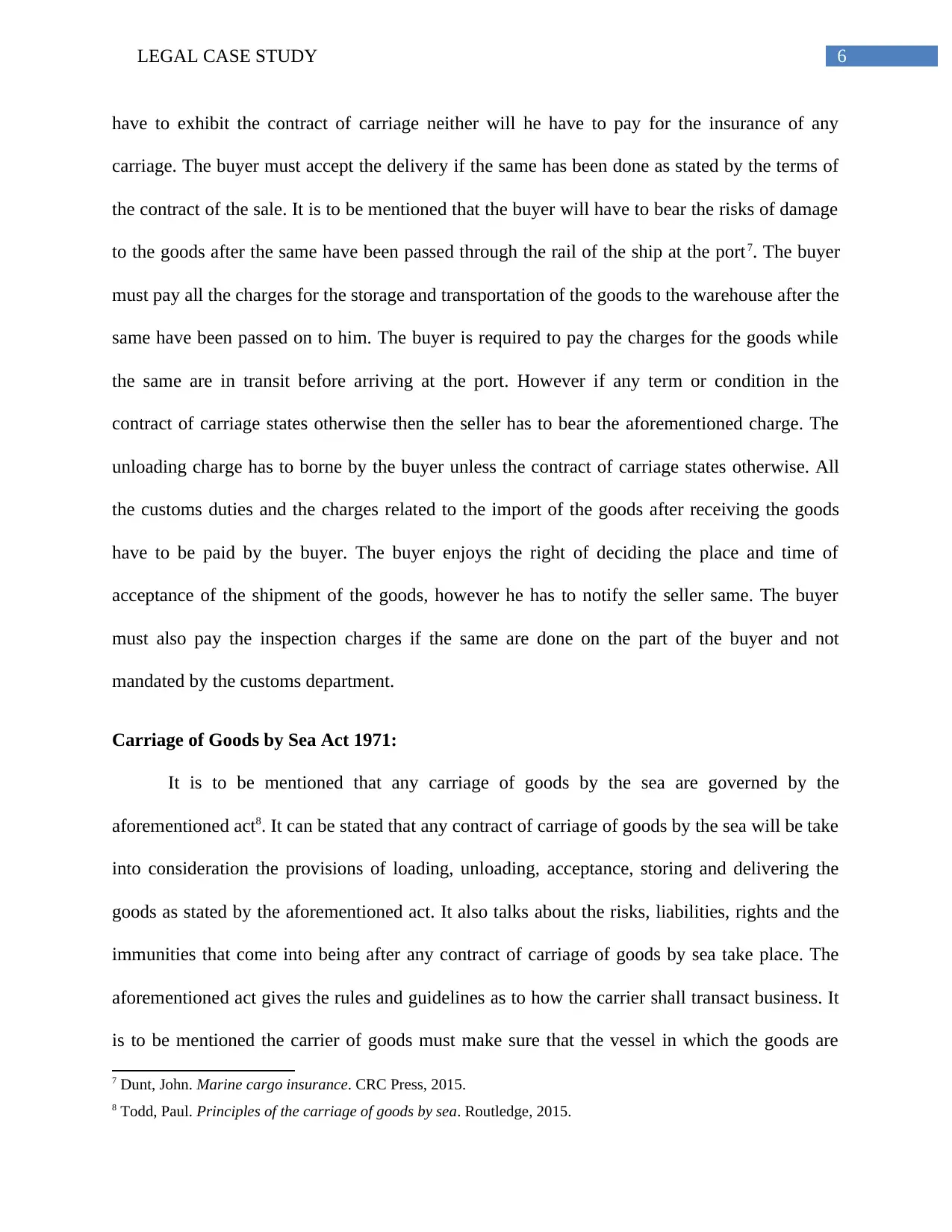
6LEGAL CASE STUDY
have to exhibit the contract of carriage neither will he have to pay for the insurance of any
carriage. The buyer must accept the delivery if the same has been done as stated by the terms of
the contract of the sale. It is to be mentioned that the buyer will have to bear the risks of damage
to the goods after the same have been passed through the rail of the ship at the port7. The buyer
must pay all the charges for the storage and transportation of the goods to the warehouse after the
same have been passed on to him. The buyer is required to pay the charges for the goods while
the same are in transit before arriving at the port. However if any term or condition in the
contract of carriage states otherwise then the seller has to bear the aforementioned charge. The
unloading charge has to borne by the buyer unless the contract of carriage states otherwise. All
the customs duties and the charges related to the import of the goods after receiving the goods
have to be paid by the buyer. The buyer enjoys the right of deciding the place and time of
acceptance of the shipment of the goods, however he has to notify the seller same. The buyer
must also pay the inspection charges if the same are done on the part of the buyer and not
mandated by the customs department.
Carriage of Goods by Sea Act 1971:
It is to be mentioned that any carriage of goods by the sea are governed by the
aforementioned act8. It can be stated that any contract of carriage of goods by the sea will be take
into consideration the provisions of loading, unloading, acceptance, storing and delivering the
goods as stated by the aforementioned act. It also talks about the risks, liabilities, rights and the
immunities that come into being after any contract of carriage of goods by sea take place. The
aforementioned act gives the rules and guidelines as to how the carrier shall transact business. It
is to be mentioned the carrier of goods must make sure that the vessel in which the goods are
7 Dunt, John. Marine cargo insurance. CRC Press, 2015.
8 Todd, Paul. Principles of the carriage of goods by sea. Routledge, 2015.
have to exhibit the contract of carriage neither will he have to pay for the insurance of any
carriage. The buyer must accept the delivery if the same has been done as stated by the terms of
the contract of the sale. It is to be mentioned that the buyer will have to bear the risks of damage
to the goods after the same have been passed through the rail of the ship at the port7. The buyer
must pay all the charges for the storage and transportation of the goods to the warehouse after the
same have been passed on to him. The buyer is required to pay the charges for the goods while
the same are in transit before arriving at the port. However if any term or condition in the
contract of carriage states otherwise then the seller has to bear the aforementioned charge. The
unloading charge has to borne by the buyer unless the contract of carriage states otherwise. All
the customs duties and the charges related to the import of the goods after receiving the goods
have to be paid by the buyer. The buyer enjoys the right of deciding the place and time of
acceptance of the shipment of the goods, however he has to notify the seller same. The buyer
must also pay the inspection charges if the same are done on the part of the buyer and not
mandated by the customs department.
Carriage of Goods by Sea Act 1971:
It is to be mentioned that any carriage of goods by the sea are governed by the
aforementioned act8. It can be stated that any contract of carriage of goods by the sea will be take
into consideration the provisions of loading, unloading, acceptance, storing and delivering the
goods as stated by the aforementioned act. It also talks about the risks, liabilities, rights and the
immunities that come into being after any contract of carriage of goods by sea take place. The
aforementioned act gives the rules and guidelines as to how the carrier shall transact business. It
is to be mentioned the carrier of goods must make sure that the vessel in which the goods are
7 Dunt, John. Marine cargo insurance. CRC Press, 2015.
8 Todd, Paul. Principles of the carriage of goods by sea. Routledge, 2015.
Paraphrase This Document
Need a fresh take? Get an instant paraphrase of this document with our AI Paraphraser
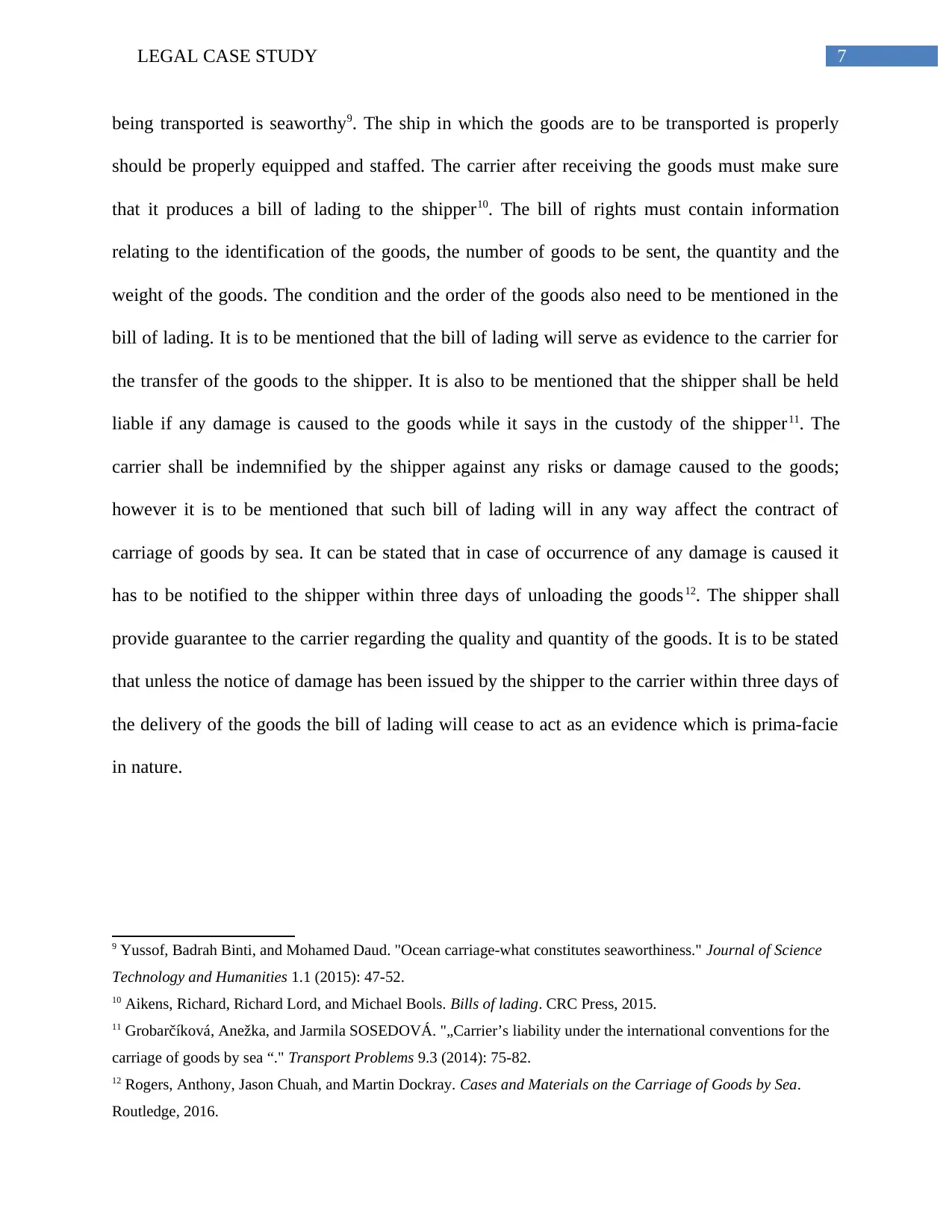
7LEGAL CASE STUDY
being transported is seaworthy9. The ship in which the goods are to be transported is properly
should be properly equipped and staffed. The carrier after receiving the goods must make sure
that it produces a bill of lading to the shipper10. The bill of rights must contain information
relating to the identification of the goods, the number of goods to be sent, the quantity and the
weight of the goods. The condition and the order of the goods also need to be mentioned in the
bill of lading. It is to be mentioned that the bill of lading will serve as evidence to the carrier for
the transfer of the goods to the shipper. It is also to be mentioned that the shipper shall be held
liable if any damage is caused to the goods while it says in the custody of the shipper11. The
carrier shall be indemnified by the shipper against any risks or damage caused to the goods;
however it is to be mentioned that such bill of lading will in any way affect the contract of
carriage of goods by sea. It can be stated that in case of occurrence of any damage is caused it
has to be notified to the shipper within three days of unloading the goods12. The shipper shall
provide guarantee to the carrier regarding the quality and quantity of the goods. It is to be stated
that unless the notice of damage has been issued by the shipper to the carrier within three days of
the delivery of the goods the bill of lading will cease to act as an evidence which is prima-facie
in nature.
9 Yussof, Badrah Binti, and Mohamed Daud. "Ocean carriage-what constitutes seaworthiness." Journal of Science
Technology and Humanities 1.1 (2015): 47-52.
10 Aikens, Richard, Richard Lord, and Michael Bools. Bills of lading. CRC Press, 2015.
11 Grobarčíková, Anežka, and Jarmila SOSEDOVÁ. "„Carrier’s liability under the international conventions for the
carriage of goods by sea “." Transport Problems 9.3 (2014): 75-82.
12 Rogers, Anthony, Jason Chuah, and Martin Dockray. Cases and Materials on the Carriage of Goods by Sea.
Routledge, 2016.
being transported is seaworthy9. The ship in which the goods are to be transported is properly
should be properly equipped and staffed. The carrier after receiving the goods must make sure
that it produces a bill of lading to the shipper10. The bill of rights must contain information
relating to the identification of the goods, the number of goods to be sent, the quantity and the
weight of the goods. The condition and the order of the goods also need to be mentioned in the
bill of lading. It is to be mentioned that the bill of lading will serve as evidence to the carrier for
the transfer of the goods to the shipper. It is also to be mentioned that the shipper shall be held
liable if any damage is caused to the goods while it says in the custody of the shipper11. The
carrier shall be indemnified by the shipper against any risks or damage caused to the goods;
however it is to be mentioned that such bill of lading will in any way affect the contract of
carriage of goods by sea. It can be stated that in case of occurrence of any damage is caused it
has to be notified to the shipper within three days of unloading the goods12. The shipper shall
provide guarantee to the carrier regarding the quality and quantity of the goods. It is to be stated
that unless the notice of damage has been issued by the shipper to the carrier within three days of
the delivery of the goods the bill of lading will cease to act as an evidence which is prima-facie
in nature.
9 Yussof, Badrah Binti, and Mohamed Daud. "Ocean carriage-what constitutes seaworthiness." Journal of Science
Technology and Humanities 1.1 (2015): 47-52.
10 Aikens, Richard, Richard Lord, and Michael Bools. Bills of lading. CRC Press, 2015.
11 Grobarčíková, Anežka, and Jarmila SOSEDOVÁ. "„Carrier’s liability under the international conventions for the
carriage of goods by sea “." Transport Problems 9.3 (2014): 75-82.
12 Rogers, Anthony, Jason Chuah, and Martin Dockray. Cases and Materials on the Carriage of Goods by Sea.
Routledge, 2016.
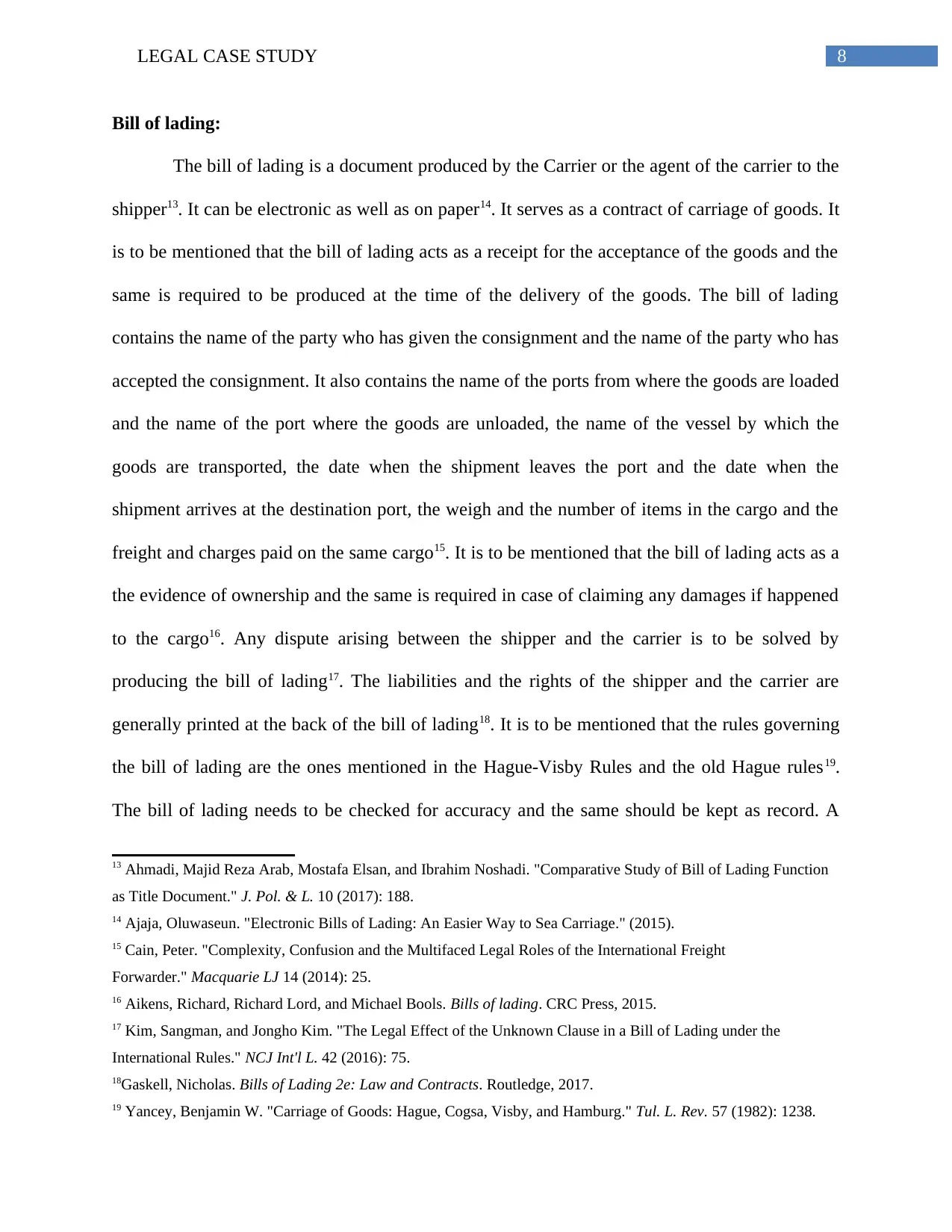
8LEGAL CASE STUDY
Bill of lading:
The bill of lading is a document produced by the Carrier or the agent of the carrier to the
shipper13. It can be electronic as well as on paper14. It serves as a contract of carriage of goods. It
is to be mentioned that the bill of lading acts as a receipt for the acceptance of the goods and the
same is required to be produced at the time of the delivery of the goods. The bill of lading
contains the name of the party who has given the consignment and the name of the party who has
accepted the consignment. It also contains the name of the ports from where the goods are loaded
and the name of the port where the goods are unloaded, the name of the vessel by which the
goods are transported, the date when the shipment leaves the port and the date when the
shipment arrives at the destination port, the weigh and the number of items in the cargo and the
freight and charges paid on the same cargo15. It is to be mentioned that the bill of lading acts as a
the evidence of ownership and the same is required in case of claiming any damages if happened
to the cargo16. Any dispute arising between the shipper and the carrier is to be solved by
producing the bill of lading17. The liabilities and the rights of the shipper and the carrier are
generally printed at the back of the bill of lading18. It is to be mentioned that the rules governing
the bill of lading are the ones mentioned in the Hague-Visby Rules and the old Hague rules19.
The bill of lading needs to be checked for accuracy and the same should be kept as record. A
13 Ahmadi, Majid Reza Arab, Mostafa Elsan, and Ibrahim Noshadi. "Comparative Study of Bill of Lading Function
as Title Document." J. Pol. & L. 10 (2017): 188.
14 Ajaja, Oluwaseun. "Electronic Bills of Lading: An Easier Way to Sea Carriage." (2015).
15 Cain, Peter. "Complexity, Confusion and the Multifaced Legal Roles of the International Freight
Forwarder." Macquarie LJ 14 (2014): 25.
16 Aikens, Richard, Richard Lord, and Michael Bools. Bills of lading. CRC Press, 2015.
17 Kim, Sangman, and Jongho Kim. "The Legal Effect of the Unknown Clause in a Bill of Lading under the
International Rules." NCJ Int'l L. 42 (2016): 75.
18Gaskell, Nicholas. Bills of Lading 2e: Law and Contracts. Routledge, 2017.
19 Yancey, Benjamin W. "Carriage of Goods: Hague, Cogsa, Visby, and Hamburg." Tul. L. Rev. 57 (1982): 1238.
Bill of lading:
The bill of lading is a document produced by the Carrier or the agent of the carrier to the
shipper13. It can be electronic as well as on paper14. It serves as a contract of carriage of goods. It
is to be mentioned that the bill of lading acts as a receipt for the acceptance of the goods and the
same is required to be produced at the time of the delivery of the goods. The bill of lading
contains the name of the party who has given the consignment and the name of the party who has
accepted the consignment. It also contains the name of the ports from where the goods are loaded
and the name of the port where the goods are unloaded, the name of the vessel by which the
goods are transported, the date when the shipment leaves the port and the date when the
shipment arrives at the destination port, the weigh and the number of items in the cargo and the
freight and charges paid on the same cargo15. It is to be mentioned that the bill of lading acts as a
the evidence of ownership and the same is required in case of claiming any damages if happened
to the cargo16. Any dispute arising between the shipper and the carrier is to be solved by
producing the bill of lading17. The liabilities and the rights of the shipper and the carrier are
generally printed at the back of the bill of lading18. It is to be mentioned that the rules governing
the bill of lading are the ones mentioned in the Hague-Visby Rules and the old Hague rules19.
The bill of lading needs to be checked for accuracy and the same should be kept as record. A
13 Ahmadi, Majid Reza Arab, Mostafa Elsan, and Ibrahim Noshadi. "Comparative Study of Bill of Lading Function
as Title Document." J. Pol. & L. 10 (2017): 188.
14 Ajaja, Oluwaseun. "Electronic Bills of Lading: An Easier Way to Sea Carriage." (2015).
15 Cain, Peter. "Complexity, Confusion and the Multifaced Legal Roles of the International Freight
Forwarder." Macquarie LJ 14 (2014): 25.
16 Aikens, Richard, Richard Lord, and Michael Bools. Bills of lading. CRC Press, 2015.
17 Kim, Sangman, and Jongho Kim. "The Legal Effect of the Unknown Clause in a Bill of Lading under the
International Rules." NCJ Int'l L. 42 (2016): 75.
18Gaskell, Nicholas. Bills of Lading 2e: Law and Contracts. Routledge, 2017.
19 Yancey, Benjamin W. "Carriage of Goods: Hague, Cogsa, Visby, and Hamburg." Tul. L. Rev. 57 (1982): 1238.
⊘ This is a preview!⊘
Do you want full access?
Subscribe today to unlock all pages.

Trusted by 1+ million students worldwide
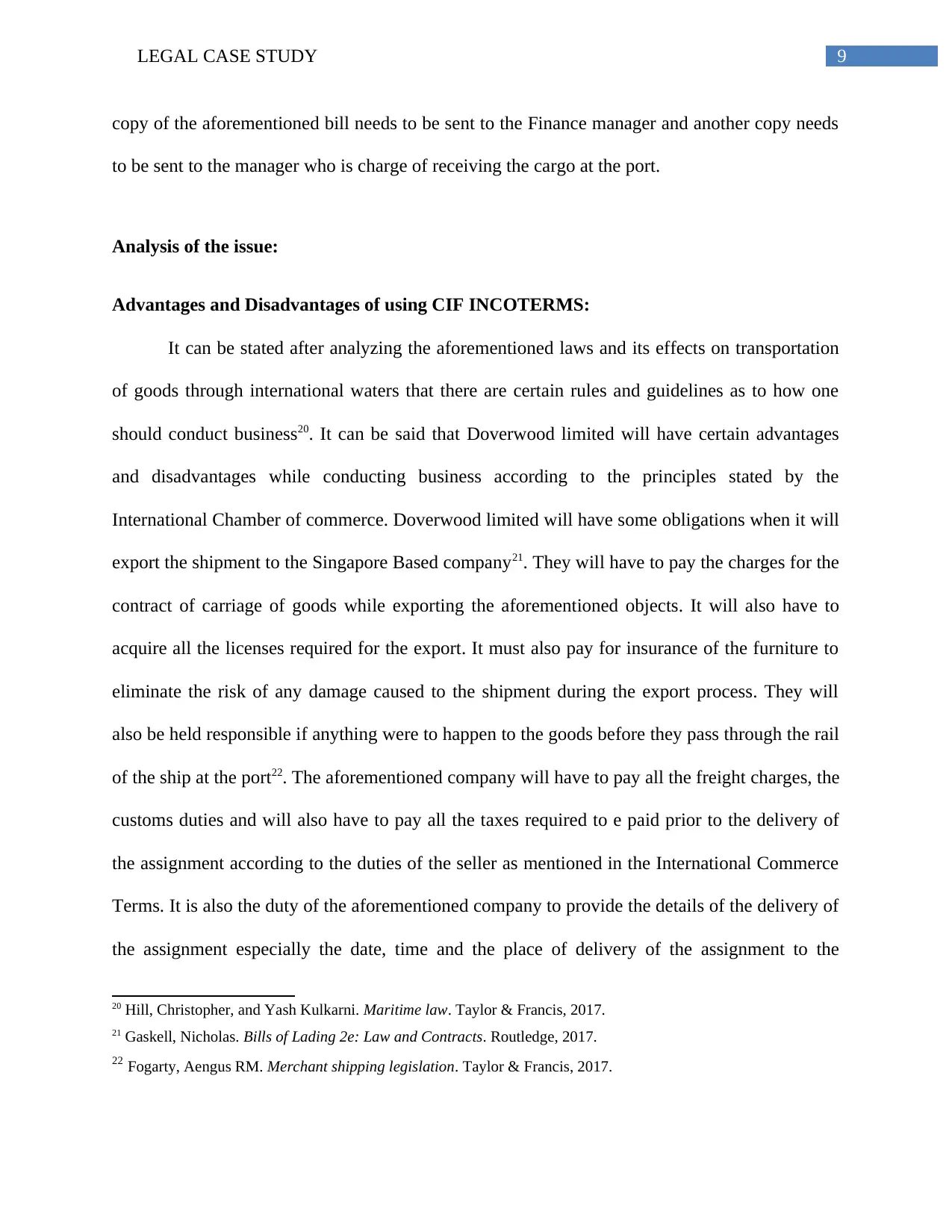
9LEGAL CASE STUDY
copy of the aforementioned bill needs to be sent to the Finance manager and another copy needs
to be sent to the manager who is charge of receiving the cargo at the port.
Analysis of the issue:
Advantages and Disadvantages of using CIF INCOTERMS:
It can be stated after analyzing the aforementioned laws and its effects on transportation
of goods through international waters that there are certain rules and guidelines as to how one
should conduct business20. It can be said that Doverwood limited will have certain advantages
and disadvantages while conducting business according to the principles stated by the
International Chamber of commerce. Doverwood limited will have some obligations when it will
export the shipment to the Singapore Based company21. They will have to pay the charges for the
contract of carriage of goods while exporting the aforementioned objects. It will also have to
acquire all the licenses required for the export. It must also pay for insurance of the furniture to
eliminate the risk of any damage caused to the shipment during the export process. They will
also be held responsible if anything were to happen to the goods before they pass through the rail
of the ship at the port22. The aforementioned company will have to pay all the freight charges, the
customs duties and will also have to pay all the taxes required to e paid prior to the delivery of
the assignment according to the duties of the seller as mentioned in the International Commerce
Terms. It is also the duty of the aforementioned company to provide the details of the delivery of
the assignment especially the date, time and the place of delivery of the assignment to the
20 Hill, Christopher, and Yash Kulkarni. Maritime law. Taylor & Francis, 2017.
21 Gaskell, Nicholas. Bills of Lading 2e: Law and Contracts. Routledge, 2017.
22 Fogarty, Aengus RM. Merchant shipping legislation. Taylor & Francis, 2017.
copy of the aforementioned bill needs to be sent to the Finance manager and another copy needs
to be sent to the manager who is charge of receiving the cargo at the port.
Analysis of the issue:
Advantages and Disadvantages of using CIF INCOTERMS:
It can be stated after analyzing the aforementioned laws and its effects on transportation
of goods through international waters that there are certain rules and guidelines as to how one
should conduct business20. It can be said that Doverwood limited will have certain advantages
and disadvantages while conducting business according to the principles stated by the
International Chamber of commerce. Doverwood limited will have some obligations when it will
export the shipment to the Singapore Based company21. They will have to pay the charges for the
contract of carriage of goods while exporting the aforementioned objects. It will also have to
acquire all the licenses required for the export. It must also pay for insurance of the furniture to
eliminate the risk of any damage caused to the shipment during the export process. They will
also be held responsible if anything were to happen to the goods before they pass through the rail
of the ship at the port22. The aforementioned company will have to pay all the freight charges, the
customs duties and will also have to pay all the taxes required to e paid prior to the delivery of
the assignment according to the duties of the seller as mentioned in the International Commerce
Terms. It is also the duty of the aforementioned company to provide the details of the delivery of
the assignment especially the date, time and the place of delivery of the assignment to the
20 Hill, Christopher, and Yash Kulkarni. Maritime law. Taylor & Francis, 2017.
21 Gaskell, Nicholas. Bills of Lading 2e: Law and Contracts. Routledge, 2017.
22 Fogarty, Aengus RM. Merchant shipping legislation. Taylor & Francis, 2017.
Paraphrase This Document
Need a fresh take? Get an instant paraphrase of this document with our AI Paraphraser
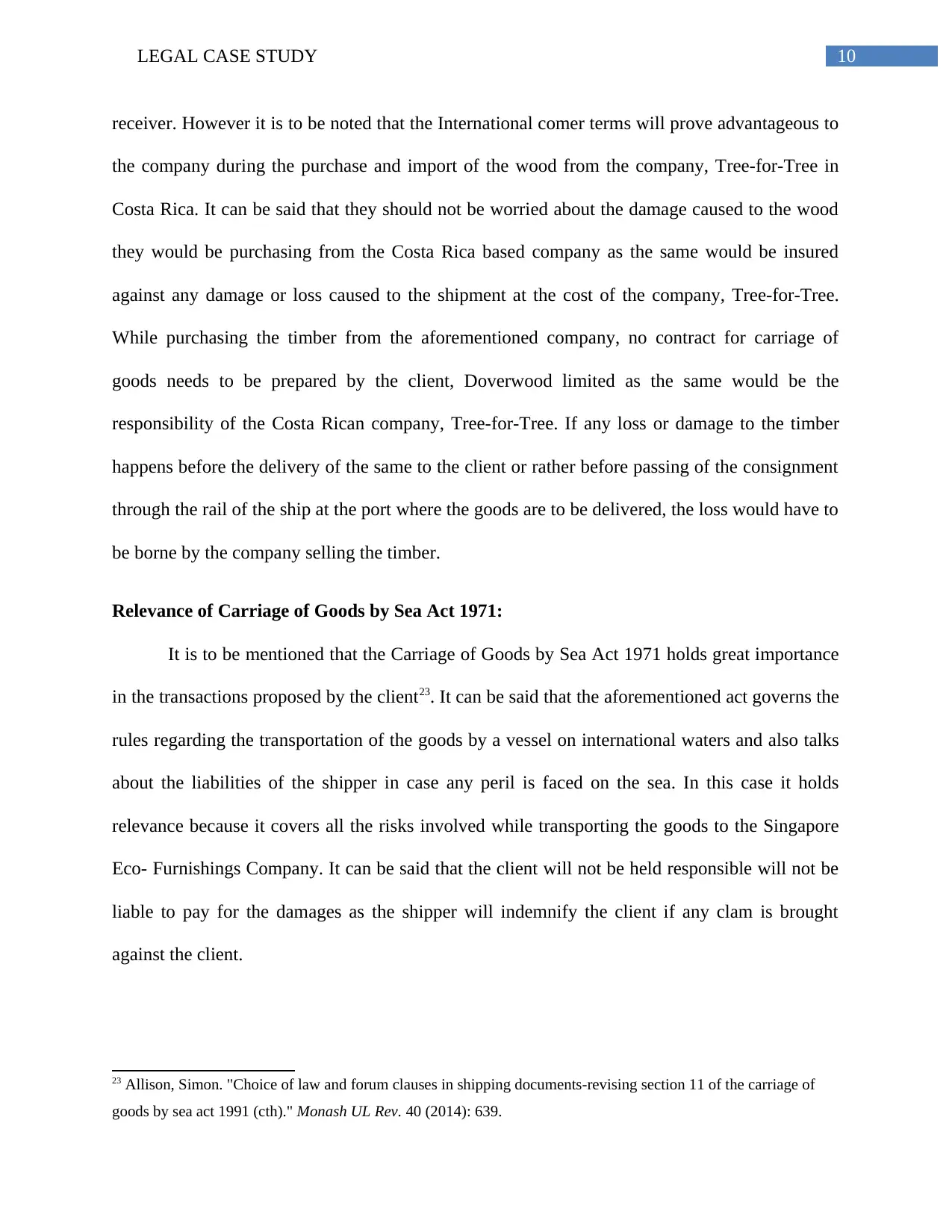
10LEGAL CASE STUDY
receiver. However it is to be noted that the International comer terms will prove advantageous to
the company during the purchase and import of the wood from the company, Tree-for-Tree in
Costa Rica. It can be said that they should not be worried about the damage caused to the wood
they would be purchasing from the Costa Rica based company as the same would be insured
against any damage or loss caused to the shipment at the cost of the company, Tree-for-Tree.
While purchasing the timber from the aforementioned company, no contract for carriage of
goods needs to be prepared by the client, Doverwood limited as the same would be the
responsibility of the Costa Rican company, Tree-for-Tree. If any loss or damage to the timber
happens before the delivery of the same to the client or rather before passing of the consignment
through the rail of the ship at the port where the goods are to be delivered, the loss would have to
be borne by the company selling the timber.
Relevance of Carriage of Goods by Sea Act 1971:
It is to be mentioned that the Carriage of Goods by Sea Act 1971 holds great importance
in the transactions proposed by the client23. It can be said that the aforementioned act governs the
rules regarding the transportation of the goods by a vessel on international waters and also talks
about the liabilities of the shipper in case any peril is faced on the sea. In this case it holds
relevance because it covers all the risks involved while transporting the goods to the Singapore
Eco- Furnishings Company. It can be said that the client will not be held responsible will not be
liable to pay for the damages as the shipper will indemnify the client if any clam is brought
against the client.
23 Allison, Simon. "Choice of law and forum clauses in shipping documents-revising section 11 of the carriage of
goods by sea act 1991 (cth)." Monash UL Rev. 40 (2014): 639.
receiver. However it is to be noted that the International comer terms will prove advantageous to
the company during the purchase and import of the wood from the company, Tree-for-Tree in
Costa Rica. It can be said that they should not be worried about the damage caused to the wood
they would be purchasing from the Costa Rica based company as the same would be insured
against any damage or loss caused to the shipment at the cost of the company, Tree-for-Tree.
While purchasing the timber from the aforementioned company, no contract for carriage of
goods needs to be prepared by the client, Doverwood limited as the same would be the
responsibility of the Costa Rican company, Tree-for-Tree. If any loss or damage to the timber
happens before the delivery of the same to the client or rather before passing of the consignment
through the rail of the ship at the port where the goods are to be delivered, the loss would have to
be borne by the company selling the timber.
Relevance of Carriage of Goods by Sea Act 1971:
It is to be mentioned that the Carriage of Goods by Sea Act 1971 holds great importance
in the transactions proposed by the client23. It can be said that the aforementioned act governs the
rules regarding the transportation of the goods by a vessel on international waters and also talks
about the liabilities of the shipper in case any peril is faced on the sea. In this case it holds
relevance because it covers all the risks involved while transporting the goods to the Singapore
Eco- Furnishings Company. It can be said that the client will not be held responsible will not be
liable to pay for the damages as the shipper will indemnify the client if any clam is brought
against the client.
23 Allison, Simon. "Choice of law and forum clauses in shipping documents-revising section 11 of the carriage of
goods by sea act 1991 (cth)." Monash UL Rev. 40 (2014): 639.
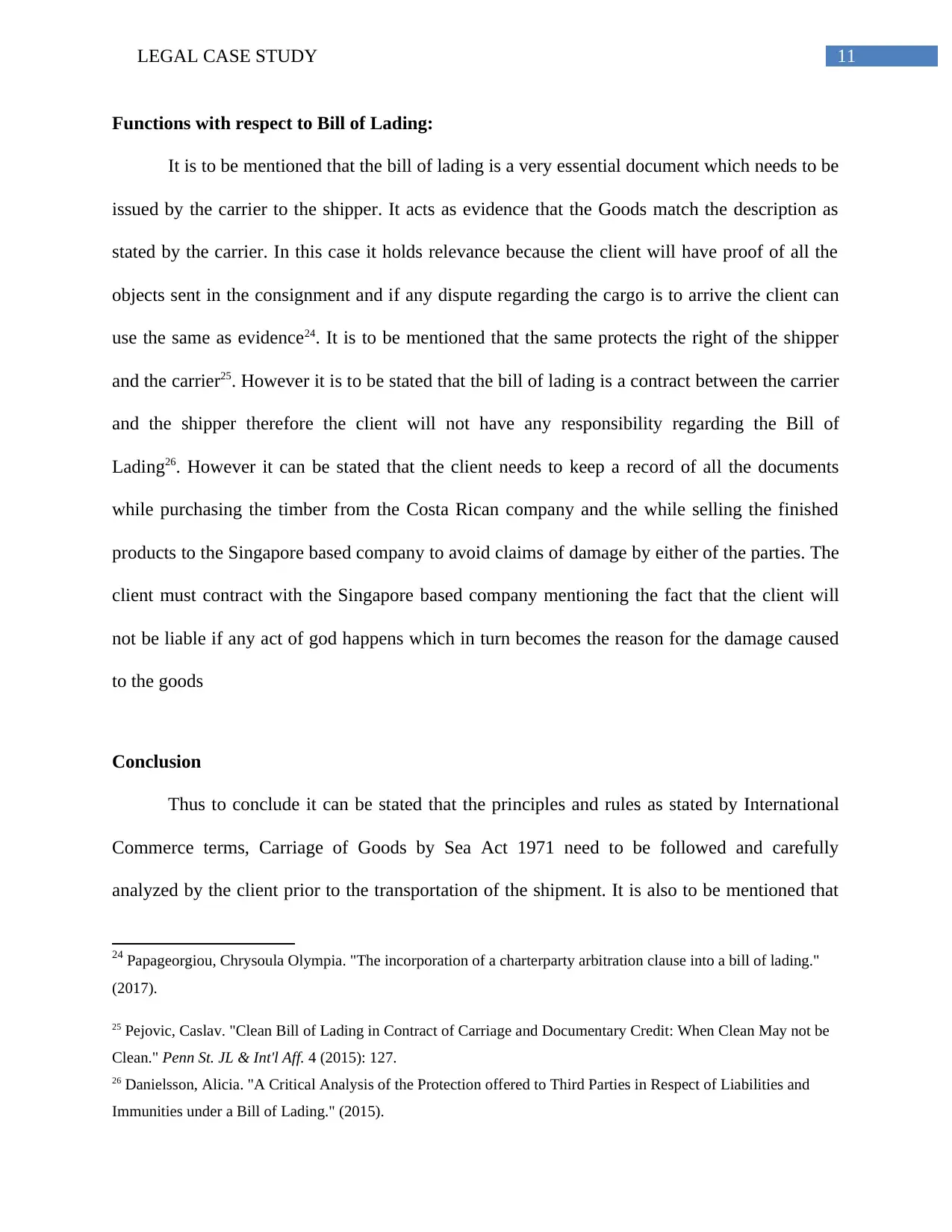
11LEGAL CASE STUDY
Functions with respect to Bill of Lading:
It is to be mentioned that the bill of lading is a very essential document which needs to be
issued by the carrier to the shipper. It acts as evidence that the Goods match the description as
stated by the carrier. In this case it holds relevance because the client will have proof of all the
objects sent in the consignment and if any dispute regarding the cargo is to arrive the client can
use the same as evidence24. It is to be mentioned that the same protects the right of the shipper
and the carrier25. However it is to be stated that the bill of lading is a contract between the carrier
and the shipper therefore the client will not have any responsibility regarding the Bill of
Lading26. However it can be stated that the client needs to keep a record of all the documents
while purchasing the timber from the Costa Rican company and the while selling the finished
products to the Singapore based company to avoid claims of damage by either of the parties. The
client must contract with the Singapore based company mentioning the fact that the client will
not be liable if any act of god happens which in turn becomes the reason for the damage caused
to the goods
Conclusion
Thus to conclude it can be stated that the principles and rules as stated by International
Commerce terms, Carriage of Goods by Sea Act 1971 need to be followed and carefully
analyzed by the client prior to the transportation of the shipment. It is also to be mentioned that
24 Papageorgiou, Chrysoula Olympia. "The incorporation of a charterparty arbitration clause into a bill of lading."
(2017).
25 Pejovic, Caslav. "Clean Bill of Lading in Contract of Carriage and Documentary Credit: When Clean May not be
Clean." Penn St. JL & Int'l Aff. 4 (2015): 127.
26 Danielsson, Alicia. "A Critical Analysis of the Protection offered to Third Parties in Respect of Liabilities and
Immunities under a Bill of Lading." (2015).
Functions with respect to Bill of Lading:
It is to be mentioned that the bill of lading is a very essential document which needs to be
issued by the carrier to the shipper. It acts as evidence that the Goods match the description as
stated by the carrier. In this case it holds relevance because the client will have proof of all the
objects sent in the consignment and if any dispute regarding the cargo is to arrive the client can
use the same as evidence24. It is to be mentioned that the same protects the right of the shipper
and the carrier25. However it is to be stated that the bill of lading is a contract between the carrier
and the shipper therefore the client will not have any responsibility regarding the Bill of
Lading26. However it can be stated that the client needs to keep a record of all the documents
while purchasing the timber from the Costa Rican company and the while selling the finished
products to the Singapore based company to avoid claims of damage by either of the parties. The
client must contract with the Singapore based company mentioning the fact that the client will
not be liable if any act of god happens which in turn becomes the reason for the damage caused
to the goods
Conclusion
Thus to conclude it can be stated that the principles and rules as stated by International
Commerce terms, Carriage of Goods by Sea Act 1971 need to be followed and carefully
analyzed by the client prior to the transportation of the shipment. It is also to be mentioned that
24 Papageorgiou, Chrysoula Olympia. "The incorporation of a charterparty arbitration clause into a bill of lading."
(2017).
25 Pejovic, Caslav. "Clean Bill of Lading in Contract of Carriage and Documentary Credit: When Clean May not be
Clean." Penn St. JL & Int'l Aff. 4 (2015): 127.
26 Danielsson, Alicia. "A Critical Analysis of the Protection offered to Third Parties in Respect of Liabilities and
Immunities under a Bill of Lading." (2015).
⊘ This is a preview!⊘
Do you want full access?
Subscribe today to unlock all pages.

Trusted by 1+ million students worldwide
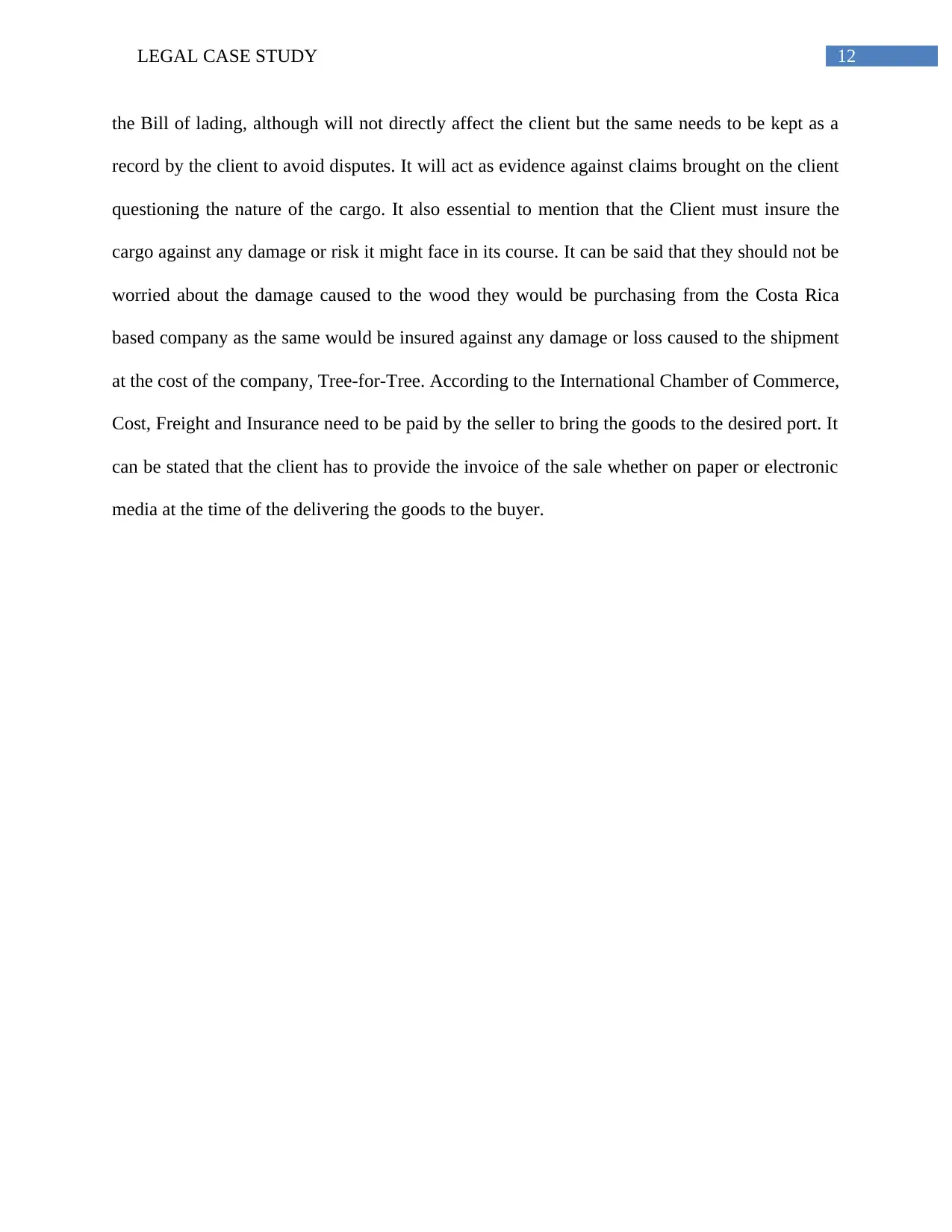
12LEGAL CASE STUDY
the Bill of lading, although will not directly affect the client but the same needs to be kept as a
record by the client to avoid disputes. It will act as evidence against claims brought on the client
questioning the nature of the cargo. It also essential to mention that the Client must insure the
cargo against any damage or risk it might face in its course. It can be said that they should not be
worried about the damage caused to the wood they would be purchasing from the Costa Rica
based company as the same would be insured against any damage or loss caused to the shipment
at the cost of the company, Tree-for-Tree. According to the International Chamber of Commerce,
Cost, Freight and Insurance need to be paid by the seller to bring the goods to the desired port. It
can be stated that the client has to provide the invoice of the sale whether on paper or electronic
media at the time of the delivering the goods to the buyer.
the Bill of lading, although will not directly affect the client but the same needs to be kept as a
record by the client to avoid disputes. It will act as evidence against claims brought on the client
questioning the nature of the cargo. It also essential to mention that the Client must insure the
cargo against any damage or risk it might face in its course. It can be said that they should not be
worried about the damage caused to the wood they would be purchasing from the Costa Rica
based company as the same would be insured against any damage or loss caused to the shipment
at the cost of the company, Tree-for-Tree. According to the International Chamber of Commerce,
Cost, Freight and Insurance need to be paid by the seller to bring the goods to the desired port. It
can be stated that the client has to provide the invoice of the sale whether on paper or electronic
media at the time of the delivering the goods to the buyer.
Paraphrase This Document
Need a fresh take? Get an instant paraphrase of this document with our AI Paraphraser
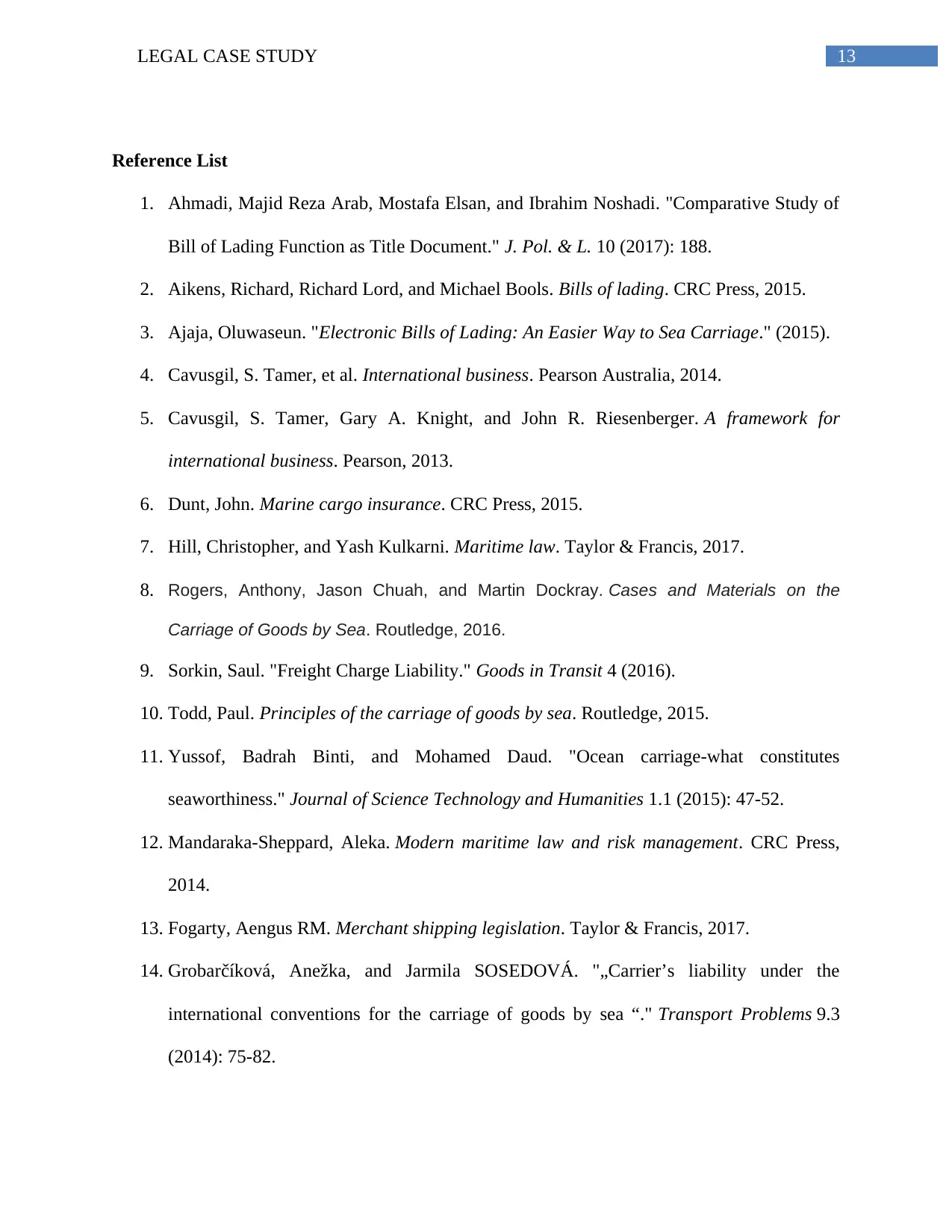
13LEGAL CASE STUDY
Reference List
1. Ahmadi, Majid Reza Arab, Mostafa Elsan, and Ibrahim Noshadi. "Comparative Study of
Bill of Lading Function as Title Document." J. Pol. & L. 10 (2017): 188.
2. Aikens, Richard, Richard Lord, and Michael Bools. Bills of lading. CRC Press, 2015.
3. Ajaja, Oluwaseun. "Electronic Bills of Lading: An Easier Way to Sea Carriage." (2015).
4. Cavusgil, S. Tamer, et al. International business. Pearson Australia, 2014.
5. Cavusgil, S. Tamer, Gary A. Knight, and John R. Riesenberger. A framework for
international business. Pearson, 2013.
6. Dunt, John. Marine cargo insurance. CRC Press, 2015.
7. Hill, Christopher, and Yash Kulkarni. Maritime law. Taylor & Francis, 2017.
8. Rogers, Anthony, Jason Chuah, and Martin Dockray. Cases and Materials on the
Carriage of Goods by Sea. Routledge, 2016.
9. Sorkin, Saul. "Freight Charge Liability." Goods in Transit 4 (2016).
10. Todd, Paul. Principles of the carriage of goods by sea. Routledge, 2015.
11. Yussof, Badrah Binti, and Mohamed Daud. "Ocean carriage-what constitutes
seaworthiness." Journal of Science Technology and Humanities 1.1 (2015): 47-52.
12. Mandaraka-Sheppard, Aleka. Modern maritime law and risk management. CRC Press,
2014.
13. Fogarty, Aengus RM. Merchant shipping legislation. Taylor & Francis, 2017.
14. Grobarčíková, Anežka, and Jarmila SOSEDOVÁ. "„Carrier’s liability under the
international conventions for the carriage of goods by sea “." Transport Problems 9.3
(2014): 75-82.
Reference List
1. Ahmadi, Majid Reza Arab, Mostafa Elsan, and Ibrahim Noshadi. "Comparative Study of
Bill of Lading Function as Title Document." J. Pol. & L. 10 (2017): 188.
2. Aikens, Richard, Richard Lord, and Michael Bools. Bills of lading. CRC Press, 2015.
3. Ajaja, Oluwaseun. "Electronic Bills of Lading: An Easier Way to Sea Carriage." (2015).
4. Cavusgil, S. Tamer, et al. International business. Pearson Australia, 2014.
5. Cavusgil, S. Tamer, Gary A. Knight, and John R. Riesenberger. A framework for
international business. Pearson, 2013.
6. Dunt, John. Marine cargo insurance. CRC Press, 2015.
7. Hill, Christopher, and Yash Kulkarni. Maritime law. Taylor & Francis, 2017.
8. Rogers, Anthony, Jason Chuah, and Martin Dockray. Cases and Materials on the
Carriage of Goods by Sea. Routledge, 2016.
9. Sorkin, Saul. "Freight Charge Liability." Goods in Transit 4 (2016).
10. Todd, Paul. Principles of the carriage of goods by sea. Routledge, 2015.
11. Yussof, Badrah Binti, and Mohamed Daud. "Ocean carriage-what constitutes
seaworthiness." Journal of Science Technology and Humanities 1.1 (2015): 47-52.
12. Mandaraka-Sheppard, Aleka. Modern maritime law and risk management. CRC Press,
2014.
13. Fogarty, Aengus RM. Merchant shipping legislation. Taylor & Francis, 2017.
14. Grobarčíková, Anežka, and Jarmila SOSEDOVÁ. "„Carrier’s liability under the
international conventions for the carriage of goods by sea “." Transport Problems 9.3
(2014): 75-82.
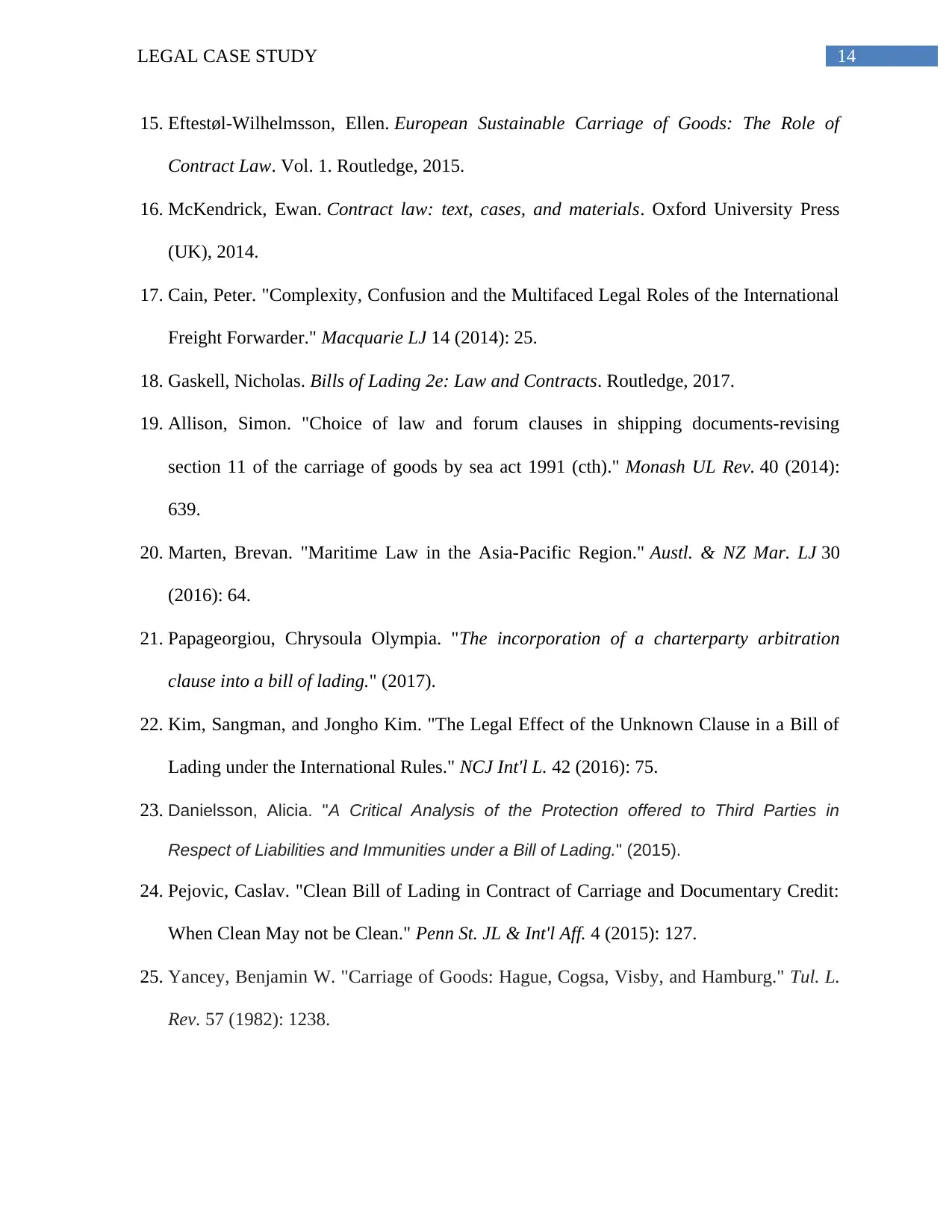
14LEGAL CASE STUDY
15. Eftestøl-Wilhelmsson, Ellen. European Sustainable Carriage of Goods: The Role of
Contract Law. Vol. 1. Routledge, 2015.
16. McKendrick, Ewan. Contract law: text, cases, and materials. Oxford University Press
(UK), 2014.
17. Cain, Peter. "Complexity, Confusion and the Multifaced Legal Roles of the International
Freight Forwarder." Macquarie LJ 14 (2014): 25.
18. Gaskell, Nicholas. Bills of Lading 2e: Law and Contracts. Routledge, 2017.
19. Allison, Simon. "Choice of law and forum clauses in shipping documents-revising
section 11 of the carriage of goods by sea act 1991 (cth)." Monash UL Rev. 40 (2014):
639.
20. Marten, Brevan. "Maritime Law in the Asia-Pacific Region." Austl. & NZ Mar. LJ 30
(2016): 64.
21. Papageorgiou, Chrysoula Olympia. "The incorporation of a charterparty arbitration
clause into a bill of lading." (2017).
22. Kim, Sangman, and Jongho Kim. "The Legal Effect of the Unknown Clause in a Bill of
Lading under the International Rules." NCJ Int'l L. 42 (2016): 75.
23. Danielsson, Alicia. "A Critical Analysis of the Protection offered to Third Parties in
Respect of Liabilities and Immunities under a Bill of Lading." (2015).
24. Pejovic, Caslav. "Clean Bill of Lading in Contract of Carriage and Documentary Credit:
When Clean May not be Clean." Penn St. JL & Int'l Aff. 4 (2015): 127.
25. Yancey, Benjamin W. "Carriage of Goods: Hague, Cogsa, Visby, and Hamburg." Tul. L.
Rev. 57 (1982): 1238.
15. Eftestøl-Wilhelmsson, Ellen. European Sustainable Carriage of Goods: The Role of
Contract Law. Vol. 1. Routledge, 2015.
16. McKendrick, Ewan. Contract law: text, cases, and materials. Oxford University Press
(UK), 2014.
17. Cain, Peter. "Complexity, Confusion and the Multifaced Legal Roles of the International
Freight Forwarder." Macquarie LJ 14 (2014): 25.
18. Gaskell, Nicholas. Bills of Lading 2e: Law and Contracts. Routledge, 2017.
19. Allison, Simon. "Choice of law and forum clauses in shipping documents-revising
section 11 of the carriage of goods by sea act 1991 (cth)." Monash UL Rev. 40 (2014):
639.
20. Marten, Brevan. "Maritime Law in the Asia-Pacific Region." Austl. & NZ Mar. LJ 30
(2016): 64.
21. Papageorgiou, Chrysoula Olympia. "The incorporation of a charterparty arbitration
clause into a bill of lading." (2017).
22. Kim, Sangman, and Jongho Kim. "The Legal Effect of the Unknown Clause in a Bill of
Lading under the International Rules." NCJ Int'l L. 42 (2016): 75.
23. Danielsson, Alicia. "A Critical Analysis of the Protection offered to Third Parties in
Respect of Liabilities and Immunities under a Bill of Lading." (2015).
24. Pejovic, Caslav. "Clean Bill of Lading in Contract of Carriage and Documentary Credit:
When Clean May not be Clean." Penn St. JL & Int'l Aff. 4 (2015): 127.
25. Yancey, Benjamin W. "Carriage of Goods: Hague, Cogsa, Visby, and Hamburg." Tul. L.
Rev. 57 (1982): 1238.
⊘ This is a preview!⊘
Do you want full access?
Subscribe today to unlock all pages.

Trusted by 1+ million students worldwide

15LEGAL CASE STUDY
1 out of 16
Your All-in-One AI-Powered Toolkit for Academic Success.
+13062052269
info@desklib.com
Available 24*7 on WhatsApp / Email
![[object Object]](/_next/static/media/star-bottom.7253800d.svg)
Unlock your academic potential
© 2024 | Zucol Services PVT LTD | All rights reserved.